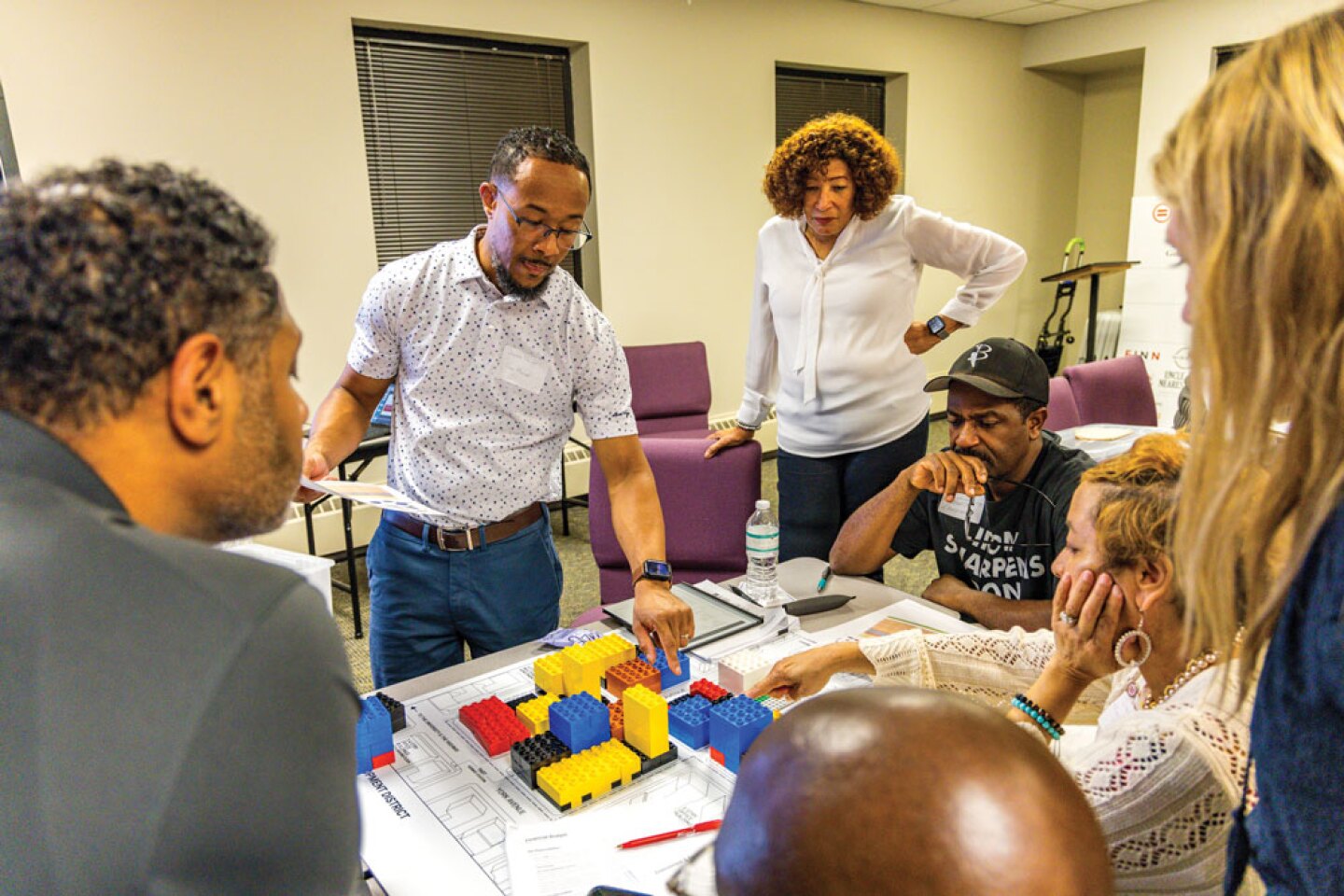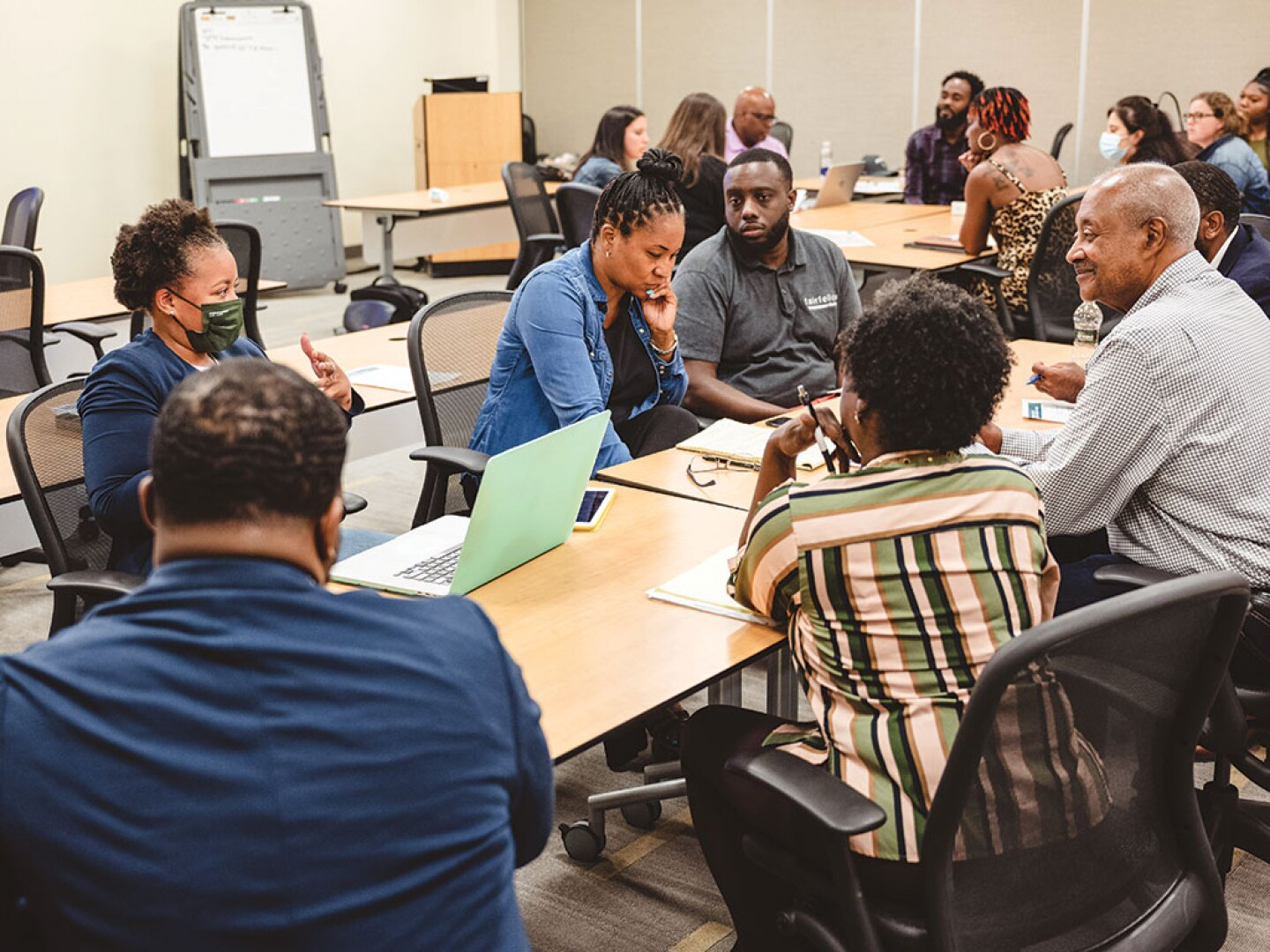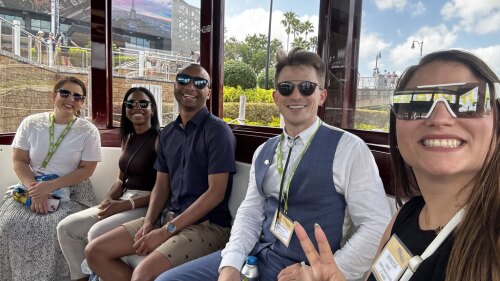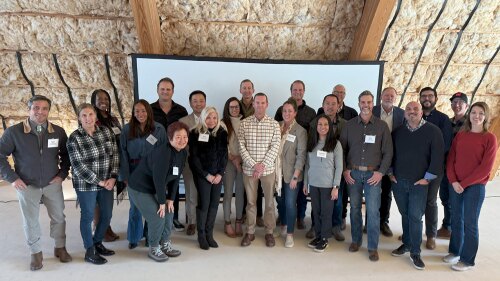The ULI Foundation is working with District Councils nationwide to leverage external grants and fund innovative programs that create meaningful change in their communities. Through strategic partnerships with local foundations and financial institutions, these councils are extending ULI’s reach and impact. Four recent gifts showcase the range of programs and the benefits that grants of all sizes can bring.
ULI Nashville and Turner Construction Company Foundation
The Turner Construction Company Foundation granted ULI Nashville $5,000 for fiscal year 2025 to fund the District Council’s participation in ULI’s UrbanPlan, a nationwide, interactive, project-based learning exercise that challenges participants—groups of high school students, university students, public officials, or community members—to engage with the complexities of urban development.
ULI Nashville started its local UrbanPlan initiative in 2021, according to Jennifer Carlat, executive director of ULI Nashville. “UrbanPlan is a way of making commercial real estate into a game, but a game that’s meaningful,” she says. The program brings participants together in a dynamic simulation: they act as competing development firms tasked with responding to a fictional request for proposals to redevelop a blighted area.
Participants must meet financial standards, affordable housing requirements, and sustainability goals, Carlat says. ULI members volunteer as facilitators and as members of a mock city council, providing critical feedback to proposals and ultimately selecting a winning team. As Carlat notes, “We’ve had attendees and members ask, ‘What’s the right answer?’ The right answer is that development is hard, and there are a lot of competing interests. Being able to set your goal and explain where you reached it and where you had to compromise—and why—that’s the win.”
Founded in 1983, the Turner Construction Company Foundation is a private nonprofit that supports charitable organizations promoting active caring, wellness, inclusion, and workforce readiness. The foundation’s grant has been instrumental in expanding the program’s reach, according to Carlat. In the 2024–2025 fiscal year, ULI Nashville has already engaged 91 participants—across high school, college, and community groups—with expectations of exceeding 100 participants before the year is done.
More than 60 trained volunteers support the program, with half of them actively participating in workshops, Carlat says: “Several volunteers have told me, ‘This reminds me why I got into this work in the first place.’” ULI used a portion of Turner’s grant to play host to a volunteer recruitment event called “So You Think You Can UrbanPlan!”
“We see UrbanPlan as part of our commitment to meet ULI’s mission priority [to educate] the next generation of diverse leaders,” Carlat says. “It shows students there are a lot of different jobs in commercial real estate that can be interesting and impactful in your community.” Half of Nashville’s metro council members, the city planning department, and community leadership organizations have all participated in UrbanPlan, gaining insights into the private sector’s experience of carrying out urban development projects.
The ULI Foundation was invaluable in helping the District Council build on its relationship with the Turner Foundation, Carlat says: “The ULI Foundation was there as we called upon them while we were having a conversation with Turner about local grant funding. We needed support in various ways to bring the deal to fruition. They were great in that role, and I know that if we had needed more, they would have been able to help as [needed].”
ULI Minnesota and the Huntington Foundation
ULI Minnesota’s Real Estate Diversity Initiative (REDI) program, now in its ninth year, received a $25,000 grant from the Huntington Foundation for fiscal year 2025. It marks the second consecutive year of funding from that foundation to support a program that has become instrumental in diversifying the real estate profession.
“The grant came through one of our member leaders, Alex Frank, who is a REDI alum and past chair of our REDI program,” says Megan Flanagan, executive director of ULI Minnesota. “Alex started working on this grant with my predecessor, doing the outreach to the Huntington Bank Foundation, and then we were invited to apply.” According to its website, Huntington Bank supports “charitable programs and initiatives that seek to improve self-sufficiency and quality of life as well as advance social and economic equality in the communities served by Huntington.” Flanagan notes that “The REDI program fit in nicely with [Huntington’s] goal of encouraging entrepreneurship and community development.”
The REDI program provides comprehensive education and networking opportunities for aspiring real estate professionals from diverse backgrounds. Participants pay $500 to join the cohort—with scholarships reducing the cost to $250 for half of the participants. “You get a year of ULI membership, which is a $540 value,” Flanagan says. “You get access to the Real Estate 101 Certificate program, about $1,300 of value. You get 12 weeks of education with speakers. You get the textbook. And you get priceless networking and connection opportunities.”
Accessibility is central to the program’s mission. “It’s been important to us, from the beginning, that cost is not a barrier to participation,” Flanagan says. The program’s funding model incorporates a mix of individual contributions, sponsorships, and foundation giving. “This year, we’ve started asking alumni who [can do so to lend] support, as well as other people who support the program,” Flanagan says. “We currently have about four people who have made individual gifts to the program, ranging from $250 all the way up to $10,000.”
ULI Cleveland and the Cleveland Foundation
ULI Cleveland secured a three-year grant totaling $75,000 from the Cleveland Foundation to support its own REDI program, which is celebrating its fifth year. The 13-week program has already graduated more than 100 participants since its inception in 2020.
“We initially launched the program for emerging real estate developers to meet a need for education, especially pro forma financial education, for diverse developers within Cleveland,” says Melanie Kortyka, executive director of ULI Cleveland. “But there are so many individuals in the region who are interested in learning more about the development process, so they can collaborate and work closely with real estate developers.”
This shift has changed the mix of participant cohorts over the years, she says: “Now, it’s split between emerging developers and individuals who work for a community development corporation or for the city’s economic development department. They want to better understand how to work with real estate developers in Cleveland.” The program accepts 30 participants annually, chosen from approximately 60 applicants.
The grant will allow ULI Cleveland to expand marketing, as well as alumni and community engagement efforts. “Our goal is to better communicate successes from the program,” Kortyka says. The program has already produced notable success stories. Andre Bryan, a REDI graduate, is now an owner’s representative for the Cleveland Guardians’ ballpark and the chief executive officer of his own construction management firm, APB & Associates. “He has been participating in ULI’s Spring and Fall meetings and become an UrbanPlan volunteer,” Kortyka notes.
“His first experience with ULI was through the REDI program,” she says. “He spoke to our class in 2024 and toured us around the Guardians’ stadium. He credits the REDI program for a lot of his success.”
The REDI program also serves as a pipeline to more advanced development education. Cleveland Development Advisors, a real estate development affiliate of the nonprofit Greater Cleveland Partnership, offers a program that is “like a 201 course that follows up on our REDI’s 101,” Kortyka says. “Cleveland Development Advisors welcomes individuals with real, funded projects to participate in [that] program. They select only 15 entrepreneurs per cohort, whereas our program accepts 30. They recently completed their first year and have now launched their second cohort, both of which have included ULI Cleveland REDI alumni.”
Founded in 1914 as the world’s first community foundation, the Cleveland Foundation has a mission to enhance the lives of all residents of Greater Cleveland.
ULI Northwest Arkansas and the Walton Family Foundation
In 2019, the Walton Family Foundation provided a capacity-building grant that was instrumental in establishing the ULI Northwest Arkansas District Council, allowing ULI to quickly build credibility in the region and address that fast-growing area’s most pressing urban development issues. Most recently, in 2024, the Walton Family Foundation provided $1.77 million to fund three ULI Northwest Arkansas programs: Aligned for Affordability, the Small Cities Initiative, and Faithful Foundations.
The Aligned for Affordability program brought together a cohort of planners from every municipality in the region to create systemic change in housing development. “As a rapidly growing metro, we were starting to sprawl,” says Wes Craiglow, executive director of ULI Northwest Arkansas. “Antiquated zoning codes were artificially constraining housing supply in city centers.” The cohort spent a year developing a policy-reform roadmap and toolkit to increase attainable housing near jobs, services, and amenities around city centers.
The Small Cities Initiative addresses a critical challenge: 61 percent of the region’s housing starts are taking place outside major cities, even as smaller municipalities lack planning capacity, according to Craiglow. With the Walton Family Foundation’s support, the initiative provides comprehensive planning assistance to cities struggling with rapid growth. “Some of these small cities don’t even have a planner on staff,” Craiglow notes. “They’re trying to figure out how to pave streets, set up trash and recycling services, and hire emergency personnel.”
The initiative draws on ULI’s Technical Assistance Panels and works with civic leaders to understand each city’s challenges, then it helps secure professional planning services through a competitive process. Cities contribute a modest 20 percent match. What began as a pilot program has now become a competitive initiative, with many of the region’s small cities applying for planning support, Craiglow says.
The most recent initiative, Faithful Foundations, empowers faith-based organizations to develop their surplus land for affordable housing. “Some of the largest land holders in any given metro area are churches,” Craiglow says. The program provides churches with the skills and support to become small-scale housing developers. “It brings together a cohort of about 20 people to spend several months learning the ins and outs of small-scale development, [with a primary focus] on housing, taught and mentored by ULI experts from our regional network,” Craiglow says.
Craiglow notes that Sam and Helen Walton, who established the Walton Family Foundation, founded Walmart in Northwest Arkansas in the mid-20th century: “The Walton Family Foundation works to ensure residents in every neighborhood can access affordable housing, diverse transportation options, and vibrant cultural spaces,” Craiglow says. “We at ULI Northwest Arkansas work toward the same.”
Private philanthropy is active in almost all U.S. metro areas, he adds, and they seek partners to aid them in their goals: “ULI’s mission is broad enough and important enough—and ULI’s brand has the credibility and the trust necessary—to help these philanthropic organizations achieve their missions,” Craiglow says. “They are looking to invest in quality of life, and they know that quality of place informs quality of life. The Walton Family Foundation is not unique in that regard.”







